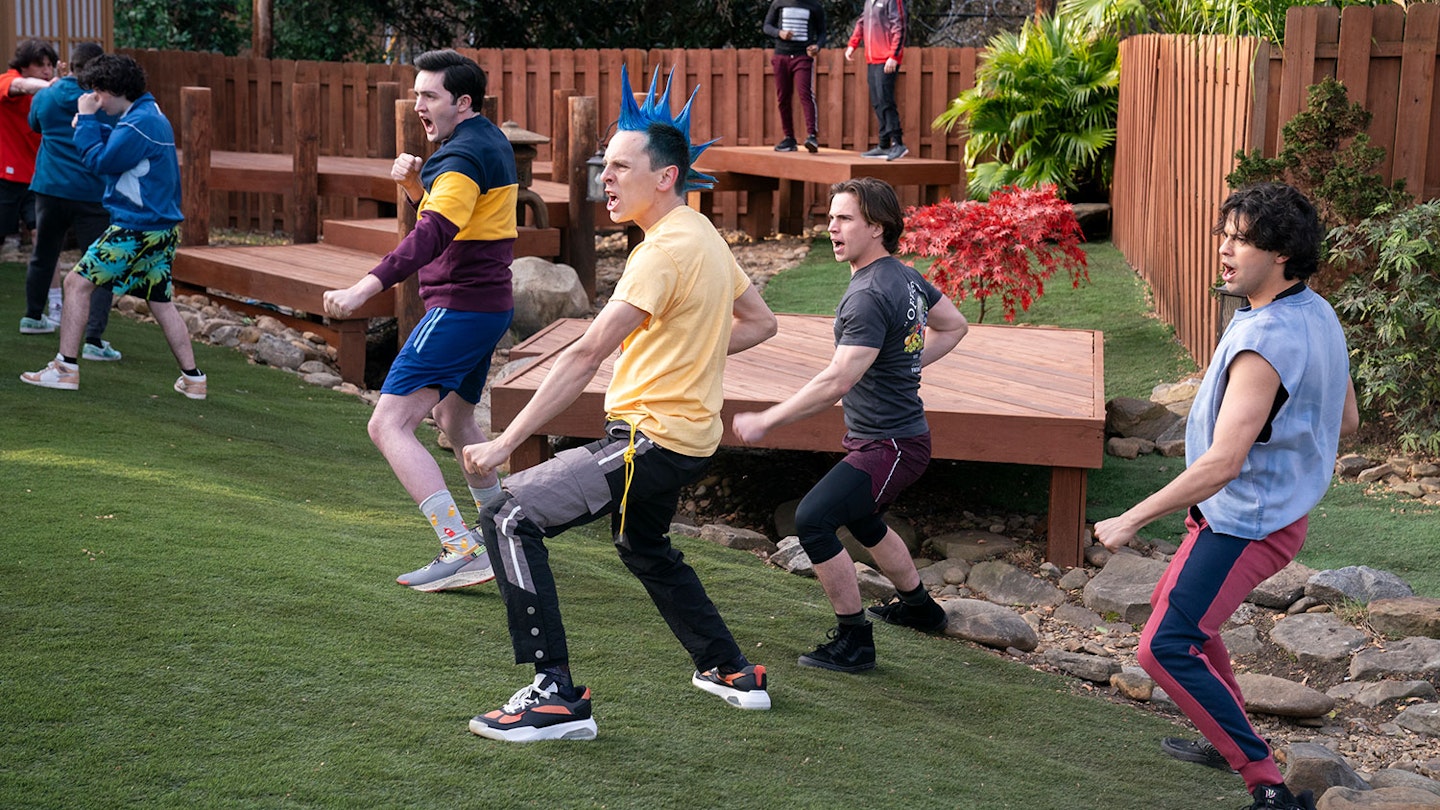With all of their troubles behind them, Daniel LaRusso (Ralph Macchio) and Johnny Lawrence (William Zabka) prepare their karate students for the Sekai Taikai world championship. But discord soon returns — along with old enemies. Plus ça change.
Streaming on: Netflix
Episodes viewed: 5 of 5
Since 2018, Cobra Kai has been as tasty as comfort TV gets. Serving up easily digestible bites of nostalgia and new kicks, this sprightly sequel series to the Karate Kid film trilogy fleshed out the OGs while spotlighting an equally compelling band of younglings. As emotional as it is brutal, it has picked at regret, ego, failure, family, abandonment, bullying and betrayal with surprising depth and tenderness. It’s also just an all-out blast, an un-guilty pleasure featuring more than a few heart-stopping moments alongside thrillingly choreographed bone-snapping brawls, all underlined with unashamed operatic (or at least soap-operatic) verve. Now, with its sixth giant season (15 episodes, split into three chunks), it is ending. But does it have anything left to say?
Season 5 wrapped things up neatly. By that point, the original movies had been exhaustively mined. Milked dry. Cobra Kai’s final miracle was to turn even The Karate Kid Part III’s piss-poor water into wine, making a truly hateable, formidable villain out of the once ridiculous Terry Silver (Thomas Ian Griffith). With him and his ponytail finally thwarted, good had triumphed over evil. Bickering old rivals Daniel (Ralph Macchio) and Johnny (William Zabka) had sorted out their differences. The kids were alright. It had been a patchy season, but it came through at the end, wrapping everything up tidily… almost. In a yawnsome twist, the original sadistic sensei, John Kreese (Martin Kove), framed by the even more sadistic Silver for a shockingly violent beatdown of Paul Walter Hauser’s Stingray, had escaped jail. One last gasp, then.
With Cobra Kai’s formula laid so bare, the show feels like it’s coasting, just when it should be hurtling towards the end.
Even after its head has been cut off, a cobra can still splutter away for a bit. So it is with Season 6, which begins with the Miyagi-Do supergroup thriving, former foes now allied, more or less. Nobody’s getting any younger — “Don’t give yourself a hernia”, Johnny says to Daniel — but as they prepare for the Sekai Taikai world championship, and with the kids now heading to university, this is Cobra Kai’s final crack of Netflix’s whip. With Silver behind bars, competition comes in the form of his second-in-command, Alicia Hannah-Kim’s no-nonsense Kim Da-Eun, teaming up with Kreese because… because that’s what the show does. Insert ‘Somehow, Palpatine returned’ gif here.
With Kreese back as the bad guy, then, here we go again. Again. It was hard, in Season 5, not to feel something for the wrongly imprisoned ne’er-do-well. Throughout the show he has been more human than he was in the films — Cobra Kai has always been good at digging into the grey areas. That’s what it was built upon: ‘Hey, what about looking at the crane kick from Johnny’s point of view?’ But Season 6 forgets all of that, shaving off Kreese’s second and third dimensions as he embraces evil once more.

And it’s not just Kreese. With harmony among the karate kids, contrivances are conjured up. Characters revert to their former selves in service of superficial plot-points. Allegiances switch quickly. Loyalties turn on a dime. Even with this season stretched out over 15 episodes, things feel rushed. It seems like the show is scrabbling around now, desperately trying to figure out who is left to pit against who, because… because that’s what the show does. Oh, and you thought Daniel and Johnny couldn’t possibly fall out again? It’s fine. THAT’S WHAT THE SHOW DOES.
These characters have — finally — outgrown this whole shebang, including the teens. Some of the young(er) actors are now in their late-twenties, and you can tell. Even the Sekai Taikai feels like a shrug — it’s the biggest karate tournament in the world, but the stakes seem so low. This is the first season that doesn’t seem to be about anything. Daniel’s never-ending obsession with Mr Miyagi, meanwhile, knows no bounds, as his dead mentor’s backstory expands further and sillier. Where once the little callbacks and tributes to Pat Morita’s incredible character and performance were gentle and touching, they now seem cheap and cynical. And with Cobra Kai’s formula laid so bare, the show feels like it’s coasting, just when it should be hurtling towards the end.
The cast rise above the material. Even with a sub-par script, Cobra Kai still makes for comfort TV. It’s always good to hang out with this obscenely likeable gang, even though it’s time for some of them to take flight (Zabka is long overdue a meaty movie career and Xolo Maridueña, so consistently pleasing as Miguel, vibrates with charisma). But they can only do so much playing lesser, regressive versions of themselves, going through the motions one more time. The hope is that the showrunners are saving the good stuff till later — there are still ten more episodes to come, and it wouldn’t be the first time Cobra Kai has gone off the rails before recovering in style. But this part feels like a crane-kick in the face.
As it readies for the end, the first third of the final season of Cobra Kai feels a little knackered. If only Mr Miyagi were around to magically massage it back to life.

